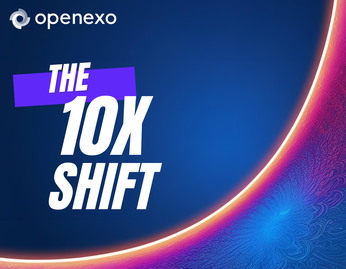
An Introduction to Exponential Organizations
ExOs leverage AI, blockchain, and IoT to achieve 10x growth, reshaping industries. From the iPhone to AWS, key innovations have paved the way for ExOs, driving unparalleled scalability and efficiency. Discover how to unlock your organization's exponential potential.
In the dynamic world of business, Exponential Organizations (ExOs) are redefining success through exponential growth and digital transformation. These organizations harness technologies like AI, blockchain, VR/AR, and IoT to achieve unparalleled scalability and efficiency. The journey of ExOs began with pivotal innovations that set the stage for a new era of organizational growth and efficiency. To understand more about what defines an ExO, explore what an Exponential Organization is.
Historical Context and Key Events
The launch of the Apple iPhone in 2007 and Amazon's EC2 cloud services in 2006 were transformative events. The iPhone, with its groundbreaking App Store, revolutionized consumer engagement by making us all app-crazy consumers overnight. The impact of the Apple iPhone launch on consumer engagement and digital transformation was profound. Meanwhile, AWS drastically reduced the cost of starting a business, from millions to thousands of dollars, enabling a surge in new business models and organizational forms. The effect of Amazon Web Services EC2 launch on startup costs and cloud computing was significant. These developments collectively applied Peter's Six Ds—digitization, deception, disruption, demonetization, dematerialization, and democratization—to computing, heralding the birth of the Exponential Organization. Learn more about how this framework applies to business transformation in the Six Ds framework.
Definition and Evolution of ExOs
ExOs are defined by their ability to achieve a 10x performance increase over their peers, leveraging new organizational techniques and accelerating technologies. The original 2014 definition emphasized this 10x metric, but the updated 2023 definition describes an ExO as a purpose-driven, agile, and scalable organization that uses these technologies to digitize, dematerialize, democratize, and demonetize products and services. These six stages illustrate how technologies evolve from being barely noticeable to completely transforming industries, driving significant decreases in the cost of producing goods and services. For a detailed look into the concept, visit What’s an ExO?.
Performance Metrics and Success Stories
The performance of ExOs is nothing short of remarkable. The top 10 ExOs listed in 2014 achieved an average market cap increase of 990% (9.9x) over eight years, significantly outperforming the S&P companies' 2.5x growth over the same period. Organizations fully applying the ExO model generally outperform those that don't by about 4x, with metrics showing 6.8x higher profitability, 40x higher shareholder returns, 11.7x better asset turnover, and 2.6x better revenue growth. The outstanding performance of ExOs is well-documented.
Government Adoption of ExO Principles
The adoption of the ExO model extends beyond the private sector. Since 2014, several dozen governments worldwide have embraced ExO principles to enhance governance and achieve significant improvements. Notable examples include Mauritius' Ministry of Oceans, the City of Miami, Medellín's Ruta N, Thailand's "Exponential Thailand" campaign, the UK's National Health Service (NHS), and the United Arab Emirates, which set 10x targets for government ministries. These initiatives highlight the model's potential to serve broader societal goals, with governments naturally aligning with the Massive Transformative Purpose (MTP) of serving their citizenry. Explore how governments are adopting these principles at Government adoption of Exponential Organization principles.
Corporate Transformation Strategies
For large corporations, the imperative to transform into ExOs is clear. In an increasingly exponential economy, embracing adaptation opens up new avenues for growth and innovation. A three-step transformation plan—awakening to an exponential future, sprinting to transform culture, and incubating disruptive ideas at the organization's edge—offers a roadmap for corporate transformation. Successful examples include Google's incubator, GoogleX (now "X" within Alphabet), Amazon's application of ExO attributes like Dashboards and Experimentation, and Apple's strategy of forming small, hyper-disruptive teams to target various industries. The challenge for big corporations is significant.
The Role of Exponential Technologies
The power of exponential technologies such as AI, blockchain, VR/AR, and IoT is at the heart of the ExO model. These technologies enable organizations to achieve unprecedented scalability and efficiency, driving transformative growth. For example, AI can automate decision-making processes, while blockchain can ensure secure and transparent transactions. The Six Ds framework provides a lens through which to understand the impact of these technologies, illustrating how they can disrupt traditional industries and create new opportunities. Learn more about the impact of AI and Blockchain on Exponential Organizations.
Future Potential and Challenges
As we look to the future, the potential for ExOs to reshape industries and drive 10x growth is immense. However, implementing ExO strategies also comes with challenges, such as cultural resistance, technological integration, and ethical considerations. The challenge for business professionals, consultants, changemakers, and C-suite executives is to embrace these transformative strategies and implement them in real-world scenarios. By balancing deterministic and constraint-based thinking with abundance thinking, organizations can unlock their exponential potential and achieve outstanding performance. For more on how ExOs and governments interact, see ExOs and Governments.
Key Takeaways and Actionable Insights
- What other events or technological advancements have contributed to the rise of Exponential Organizations?
Other significant events include the rise of AI and machine learning, the proliferation of IoT devices, and the advent of blockchain technology, all of which have enabled new business models and organizational structures. To delve deeper into the evolution of ExOs, see Exponential Organizations wiki.
- How can traditional organizations adapt to compete with ExOs effectively?
Traditional organizations can adapt by embracing digital transformation, fostering a culture of innovation, and leveraging technologies like AI and cloud computing to enhance scalability and efficiency. For strategies on digital transformation, check out discussions on Digital Transformation strategies.
- What future industries or sectors are most likely to see disruption from ExOs?
Industries such as healthcare, finance, education, and transportation are poised for disruption as ExOs leverage technologies like AI, blockchain, and IoT to revolutionize service delivery and operational efficiency. For case studies on this, visit Exponential Organizations case studies.
To begin your journey towards exponential growth, consider the following steps:
- Assess your organization's current digital capabilities and identify areas for improvement.
- Foster a culture of innovation by encouraging experimentation and learning from failures.
- Invest in technologies like AI, blockchain, and IoT to enhance scalability and efficiency.
- Set clear, ambitious goals aligned with your organization's Massive Transformative Purpose (MTP).
By exploring these questions and implementing ExO principles, organizations can position themselves at the forefront of innovation and growth. The journey towards becoming an Exponential Organization is challenging but immensely rewarding, offering the potential to achieve transformative success in an ever-evolving business landscape. Start your journey today by evaluating your organization's readiness for digital transformation.
ExO Insight Newsletter
Join the newsletter to receive the latest updates in your inbox.









